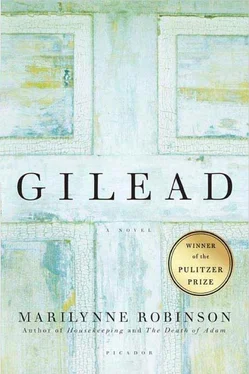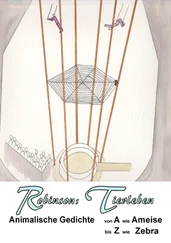***
Another morning, thank the Lord. A good night’s sleep and no real discomfort to speak of. A woman in my flock called just after breakfast and asked me to come to her house. She is elderly, recently a widow, all by herself, and she has just moved from her farm to a cottage in town. You can never know what troubles or fears such people have, and I went. It turned out that the problem was her kitchen sink. She told me, considerably amazed that a reversal so drastic could occur in a lawful universe, that hot water came from the cold faucet and cold water from the hot faucet. I suggested she might just decide to take C for hot and / / f o r cold, but she said she liked things to work the way they were supposed to. So I went home and got my screwdriver and came back and switched the handles. She said she guessed that would do until she could get a real plumber. Oh, the clerical life! I think this lady has suspected me of a certain doctrinal sloughing off, and now she will be sure of it. The story made your mother laugh, though, so my labors are repaid. Last night I finished The Trail of the Lonesome Pine. It gave me a sort of turn there for a while. The old man sees the girl with someone her own age and remarks how well suited they are, and then he starts getting old and shabby and broke, and she’s still very beautiful, of course. But it all turns out fine. She loves him only and forever. I doubt the book would have kept my interest if that particular matter had not arisen. And then I did want to know what there was in it your mother liked so much. God bless her, she’s a dear woman. I read most of it yesterday evening, and then I couldn’t sleep, wondering about it, so I crept off to my study and read till almost dawn. And then I went up to the church to watch the dawn come, because that peace does restore me better than sleep can do. It is as though there were a hoard of quiet in that room, as if any silence that ever entered that room stayed in it. I remember once as a child dreaming that my mother came into my bedroom and sat down in a chair in the corner and folded her hands in her lap and stayed there, very calm and still. It made me feel wonderfully safe, wonderfully happy. When I woke up, there she was, sitting in that chair. She smiled at me and said, “I was just enjoying the quiet.” I have that same feeling in the church, that I am dreaming what is true.
It strikes me that your mother could not have said a more heartening word to me by any other means than she did by loving that unremarkable book so much that I noticed and read it, too. That was providence telling me what she could not have told me.
I wish I could be like one of the old Vikings. I’d have the deacons carry me in and lay me down at the foot of the communion table, and then torch the old ship, and it and I would sail into eternity together. Though in fact I hope they will save that table. Surely they will.
Even the Holy of Holies was broken open. The deep darkness vanished into ordinary daylight, and the mystery of God was only made more splendid. So my dear hoard of silence can be scattered, too, and the great silence will not be any poorer for it. And yet thank God they are waiting till I die. Sometimes I almost forget my purpose in writing this, which is to tell you things I would have told you if you had grown up with me, things I believe it becomes me as a father to teach you. There are the Ten Commandments, of course, and I know you will have been particularly aware of the Fifth Commandment, Honor your father and your mother. I draw attention to it because Six, Seven, Eight, and Nine are enforced by the criminal and civil laws and by social custom. The Tenth Commandment is unenforceable, even by oneself, even with the best will in the world, and it is violated constantly. I have been candid with you about my suffering a good deal at the spectacle of all the marriages, all the households overflowing with children, especially Boughton’s — not because I wanted them, but because I wanted my own. I believe the sin of covetise is that pang of resentment you may feel when even the people you love best have what you want and don’t have. From the point of view of loving your neighbor as yourself (Leviticus 19:18), there is nothing that makes a person’s fallenness more undeniable than covetise — you feel it right in your heart, in your bones. In that way it is instructive. I have never really succeeded in obeying that Commandment, Thou shalt not covet. I avoided the experience of disobeying by keeping to myself a good deal, as I have said. I am sure I would have labored in my vocation more effectively if I had simply accepted covetise in myself as something inevitable, as Paul seems to do, as the thorn in my side, so to speak. “Rejoice with those who rejoice.” I have found that difficult too often. I was much better at weeping with those who weep. I don’t mean that as a joke, but it is kind of funny, when I think about it.
If I had lived, you’d have learned from my example, bad as well as good. So I want to tell you where I have failed, if the failures were important enough to have had real consequences, as this one certainly was.
But to return to the matter of honoring your mother. I think it is significant that the Fifth Commandment falls between those that have to do with proper worship of God and those that have to do with right conduct toward other people. I have always wondered if the Commandments should be read as occurring in order of importance. If that is correct, honoring your mother is more important than not committing murder. That seems remarkable, though I am open to the idea.
Or they may be thought of as different kinds of law, not comparable in terms of their importance, and honoring your mother might be the last in the sequence relating to right worship rather than the first in the series relating to right conduct.
I believe this is a very defensible view.
The apostle says, “Outdo one another in showing honor,” and also “Honor everyone.” The Commandment is much narrower. The old commentators usually say “your father and mother” means anyone in authority over you, but that is the way people thought for a long time and a lot of harm came from it — slavery was “patriarchal,” and so on. Anyone who happens to have authority over you is your parent! Then there have been some vicious, brutal parents in this world. “What do you mean, grinding the faces of the poor!” Does the text anywhere say, “Children will be given good things and parents will be sent empty away”? No, because parents are not equated with the rich or those in authority. Nowhere in Scripture is there a father who behaves wickedly toward his child, but the rich and powerful in Scripture are wicked much more often than not. And if honoring authority means only that you don’t go out of your way to defy it, that really cheapens the notion of honoring as it would apply to an actual mother. It would not be anything beautiful or important enough to be placed right at the center of the Ten Commandments, for goodness’ sake.
I believe the Fifth Commandment belongs in the first tablet, among the laws that describe right worship, because right worship is right perception (see especially Romans 1), and here the Scripture commands right perception of people you have a real and deep knowledge of. How you would honor someone differs with circumstances, so you can only truly fulfill a general obligation to show honor in specific cases of mutual intimacy and understanding. If all this seems lopsided in favor of parents, I would point out again that it is the consistent example of parents in the Bible that they honor their children. I think it is notable in this connection that it is not Adam but the Lord who rebukes Cain. Eli never rebukes his sons, or Samuel his. David never rebukes Absalom. At the very end, poor old Jacob rebukes his sons as he blesses them. A remarkable thing to consider.
Читать дальше












